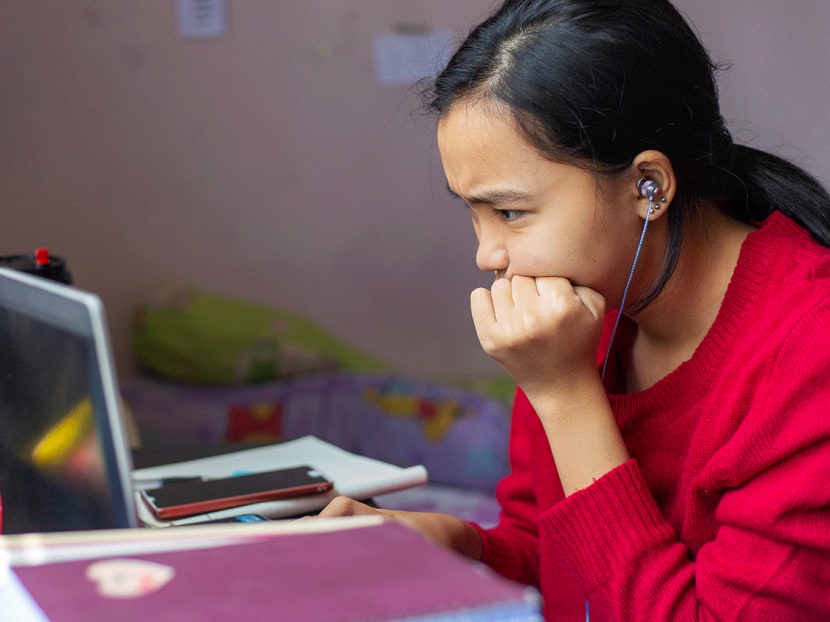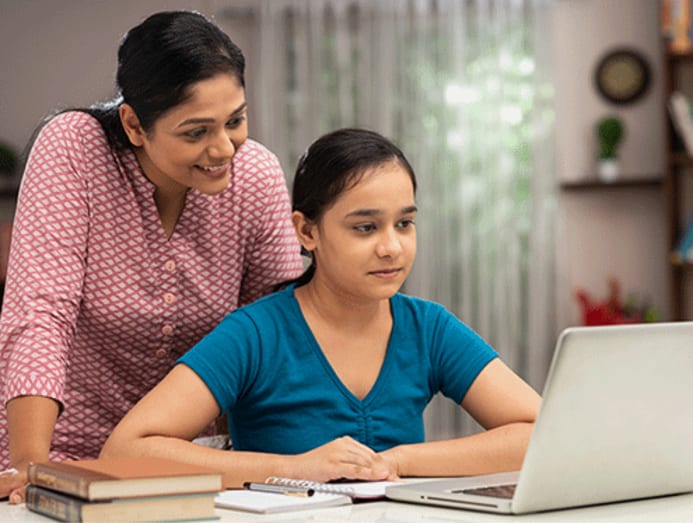Ask a therapist: How can I tell if my child is burnt out prepping for PSLE and O/N-Level exams? How can I help?
Is your child or teenager uncommunicative and irritable under pressure? Here’s a glimpse of what they tell therapists in a private and confidential setting.

(Photo: iStock)
Taking a national exam in Singapore is no walk in the park. Some count themselves lucky to have endured this rite of passage in simpler times. But others who have become parents relive the world of Ten Year Series and entry proofs through their children vicariously.
How do we support children who are sitting for their PSLE or O/N level exams?
CNA Lifestyle spoke with Shirley Woon, a 56-year-old psychotherapist with more than 15 years of counselling experience. At her private practice, The Blue Pencil, children and teenagers share things they don’t tell their parents or friends. But this rarely happens overnight.
“Some of them are dragged here and they don’t want to talk because they think I’ll tell their parents everything,” Woon said.
“So I always let the parents know I’m here to help the child. I’m not here to pass messages on their behalf.” Clients often take two to three sessions to warm up, and only when they are assured of privacy and confidentiality does therapy really begin.
WHAT CHILDREN DON’T TELL PARENTS
For PSLE and O-Level students, anxiety starts kicking in in January when everyone reminds them, like a broken record, that “this is a very important year for you”.
“It is very unintentional but it creates a lot of stress for the students,” Woon said. “Students tell me it is so annoying. Their teachers, principal, and parents are all repeating it.”
Equally hard to silence are questions at the back of their minds: What if I don’t make the express stream? What if my friends and I don’t end up in the same school? What if my parents insist I attend another school? What if I can’t adapt to the new environment?

“It is too much for a 12-year-old,” she said, adding that PSLE students undergoing puberty and hormonal changes have an exceptionally hard time. “They have a lot of anger. They’re angry with the system, their workloads, and their parents for not being more understanding. Then there is fear – if I don’t do well, what will happen to me?”
Of course, O- and N-Level students have the liberty of seeking out friends. But, rather than de-stressing in their company, commiserating with one another can cause negativity to fester. While this group has more agency over their post-secondary school choices, their decisions appear to have incredibly high stakes. Seniors are telling them that junior colleges are pressure cookers, but entering a local university through the polytechnic route is notoriously tough.
When stress calls, a fight-or-flight response answers. The limbic system, which triggers emotions, starts developing at 10 years old. But the prefrontal cortex, which governs logic and reason, does not mature till they’re in their late-20s. Due to their lack of emotional regulation skills, pre-teens and teenagers often act out.
But parents who aren’t aware of this disconnect might hold their “juvenile”, “immature” and “impulsive” behaviours against them.
At worst, they manifest as unhealthy coping mechanisms such as smoking and self-harm.
In most cases, children default to their gadgets. Unfortunately, parents often withhold these in a bid to help them concentrate better and rest earlier. To them, the phone is a bargaining chip. But to a child under immense pressure, Woon described it as “the loss of a lifeline”.
“They won’t study. They cannot focus. They sleep late because they’re on their phones,” said Woon, of the problems parents encounter. “On the other hand, their children tell me: I get to talk to my friends and share my feelings. But this is taken away. Now, where do I go? My life is nothing but studying, studying, and studying.”
Several children also have “virtual friends”, who are similarly cut off when their phones get confiscated. “I like to talk to my virtual friends,” they would tell Woon. “My virtual friends are not judgmental.”

When school gets tough, children turn to connections made on gaming and social media platforms for encouragement and advice. But understandably, most parents hear only alarm bells when they learn their children are talking to strangers online.
“When we read the papers, talking to strangers is always negative,” Woon said. “Some parents use parental guidance apps to track online activity. Others are dependent on what their child tells them. It’s all about taking precaution. At the end of the day, we have to understand who’s the adult here.”
When these online friendships are terminated by force, students not only lose a pillar of support. They also feel helpless and resentful.
While figures of authority don’t exactly transform into confidantes overnight, how can parents be there for their children from day one?
GETTING CHILDREN TO OPEN UP
It pays to be mindful of the way we speak to children, said Woon. Perhaps due to our Asian conditioning, many parents unintentionally respond in ways that do the opposite of building rapport. What does this sound like? Here’s an example:
Say a child returns from school in the evening. He says, “I am so tired.” Some parents may be quick to snap: “You think I work the whole day, I’m not tired? You only need to go to school.” To a parent, who has endured a long day of meetings, it’s a reasonable argument. But it can also discourage children from sharing their feelings.
Another unhelpful tendency is, ironically, offering unsolicited help. As adults, we automatically default to problem-solving mode. This, when done prematurely, can backfire. “A lot of my students tell me they really don’t need solutions or advice from their parents,” Woon said. “They just need them to understand”.
She raised the example of friendship problems. To a 12-year-old, being isolated by their friends might well feel like the worst day of their lives. But to a parent, it’s a mere blip in their schooling timeline. Parents who are really trying to help might say: “Never mind. Just be friends with other people” – without realising they might be downplaying their child’s experience and invalidating their feelings.
That’s not to say that solutions and advice aren’t important, came Woon’s caveat. Timing is everything. There’s a time to listen actively, and a time to solve problems. Without first understanding what their child needs from them, avoid diving headfirst into the latter.
“It’s all about asking the right questions. What do you need? How can I help you? Do you want solutions and advice? Or do you want me to listen? It helps for the child to know you are interested and trying to understand.”
When your child asks for help, be prepared to offer it. If it isn’t within your means, direct them to resources such as their classmates, tutors, or even Google. Woon stressed the importance of trusting and believing in your child, too. Many parents struggle with this, and this plays out in a conversation we know all too well:
“Have you done your homework?”
“Yes”
“Are you sure?”
“ARE YOU ANXIOUS? OR IS YOUR CHILD ANXIOUS?”
This is the first question Woon asks the parents of her clients. What most people get wrong about therapists is that they dispense advice. Really, they’re in the business of asking questions that facilitate introspection fruitfully.

“Perhaps there are unfulfilled dreams,” Woon said. “I have a client whose mother has always wanted to be a ballerina. She has no interest in ballet but is pushed to attend classes.” Likewise, they have influence over their child’s choice of subjects, choices, and schools. Parents with missed opportunities in their own lives might pin hopes on their children without first understanding where their interests truly lie.
A parent’s own upbringing manifests in other ways. Some raise their children the same way their parents did because it worked for them. Others who have had a negative experience in their formative years do everything in their power to achieve the opposite. These approaches, while well-meaning, might be out of touch with their child’s individuality and the education system today.
Crucially, a parent’s anxiety influences the way they talk about exams. All parents want the best for their children, but seemingly innocuous conversations sometimes contain messages of what is acceptable and what isn’t. These would go on to shape their child’s attitudes towards academic performance and reactions to failure.
“Rather than warning them about ending up in a certain stream if they don’t do well, show them options,” Woon said. “It does not matter even if you go to secondary school for five years. You can sit for your A-Levels in two years, or you can do it in three. The end goal is the same.”
When probing about your child’s plans for the future, tread lightly. “Talk about it when the child wants to. Even if you want to broach the subject, don’t do it too often,” said Woon. “You can ask them if they’ve thought about which school they wish to attend, but allow them to lead the conversation.”
Constantly reminding your child of their goals can also be unhelpful. To encourage them, parents may say things like, “you better study hard if you want to get into your dream school”. But in reality, this does little to motivate them. On the contrary, it might add to their stress.
EXAM SEASON DO’S AND DONT’S
According to Woon, there are three symptoms of burnout parents can look out for. One, changes in sleeping patterns. Does your child wake up feeling tired, even when they have previously managed with less sleep? Two, changes in appetite. Are they eating too much or too little all of a sudden? Three, changes in activities. Have they been forgoing activities they used to enjoy? Parents also have to consider their child’s baseline behaviours before intervening, lest they jump the gun.
Some children may also start asking existential questions. Why do I need to work so hard? What is the point of studying when the world is in a mess? It’s easy to dismiss these expressions as “teen angst”, but Woon urges parents to get curious instead. They might ask: If you choose not to study, is there something else you would like to do? How can your contribution make the world less messy? With gentle inquiry, parents could get an elusive glimpse into their children’s inner worlds.
Finally, in the last lap, Woon recommends for parents to help break the monotony of revision. On the night before the exam, for instance, they could bring children out for meals for a change. The idea is to get their minds off the upcoming paper, if only for a few hours.
“Rather than asking what paper they’re sitting for tomorrow and whether they’ve covered all the topics, don’t talk about the exams anymore. They are already aware of these things. Basically, just help them to relax.”










